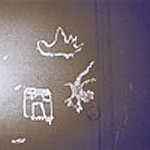|
|
 |
Dusted Reviews
Artist: Drekka Album: Take Care to Fall Label: Blue Sanct Review date: May. 20, 2002 |

|
|
|
 |
Imagine two radio stations separated on the bandwidth by just a hatch mark or two, the first partial to Sonic Youth's "Contre Le Sexisme" and bootlegged outtakes from old Eric's Trip rehearsals, the second streaming the Kranky pick of the month. If you were to get in your car, move the dial right between the two stations, open the windows, and drive straight out of range you'd have the closest approximation of Drekka's "debut" full-length Take Care to Fall I can possibly give. Not just at moments, but in its entirety, it's what you'd imagine such a drive to be like -– some bracketed moments of serene, kaleidoscopic beauty, with some long stretches where you'd prefer to pop in any old tape you can find on the floor. In this way, Take Care to Fall is an interesting and often engaging listen, but it's a record that doesn't quite seem to realize when it's onto something good enough to ride it out, or to know when it sounds like sitar and a squeaky door on a bad hangover fast enough to cut bait.
Drekka is essentially the solo project of Michael Anderson, who also heads the very fine Blue Sanct label (home of The Pilot Ships, Iditarod, and others) in Bloomington, Indiana. Take Care to Fall is announced as Anderson's first proper full-length, but his discography is already a completist's nightmare, boasting over a dozen recordings done mostly to tape or CD-R, in pressings of 10 or 25 copies. If that reminds you of tattered catalogs from 'zine distros that may or may not still be in a box of shit in your parents' attic, well, it's actually not a half-bad analogy. Separate from the prolific-by-way-of-tiny-print-runs similarity, there's something about Drekka familiar to me from former days of hoarding and trading folded 8.5" x 11" copy – the best (i.e. Cometbus, Burn Collector) and worst (of which there are thousands too many to name) of 'zines were always united by an aesthetic and approach both slapdash and shyly arrogant, fleeting and meticulously self-aware. Drekka is, and for the most part endearingly, I think, the aural equivalent: a little ragged, a little uncomfortable, a little profound. Listening to Take Care to Fall is a lot like cracking some new zine you traded for – at times you feel a bit prematurely invited to the reading, as if maybe the dough needed just a little more time to rise, or the notion of audience was one that slipped away at some point during the process. But at other times, you discover a sort of bliss at discovering beauty in such a raw and directly channeled form.
In print, Anderson announces his aims as using "simple folk song structures as a medium for recording what they sound like once inside my head," but for the most part these structures are so unraveled on Take Care to Fall that they bear little relation to "folk". In fact, there's much more of what you hear between the end of a folk record's last song and the moment the needle lifts than anything you're likely to hear on the rest of said record. Actually, the accurately titled opener, "Quite Possibly Nothing", is an approximation of this very sound alongside a banal, distant church organ. On later tracks, "songs" do start writing themselves beneath the fractured pastiche, but they're usually hovering around one often dissonant chord, so that if the aural environment they're being tinkered under isn't full enough to transform them, the result is frustrating at best. The redundant "Silent Duty", happening early on, is an early such hurdle, but better things follow. "Fractured" is hauntingly pretty – a repetitive but melodic little guitar line blown gently into acrobatic space by the ghostly whisper of ethereal female vocals. It's like Flying Saucer Attack but gentler: while that band finds epiphany by way of late night TV fuzz, "Fractured" flirts with the same effect by way of dust motes dancing through the bedroom light. "With Faith in Nothing" is a beautifully successful exercise in drone and reverb, and one of the few songs with enough room to adequately stretch out. "I Left Without Saying Goodbye (Je Suis Parti Sans Faire Mes Adieux)" is sublime and subliminal – a melancholic little lullaby enshrouded in a thin fog of slightly sinister noise. And the closing minutes of the final track, "Untitled Filmshoot", are beautifully rendered, with Anderson leading the charge of a marching guitar line and a wheezing something that might be a Brio train whistle or bagpipes punctured by buckshot, with little coughs of "Go!". Moments like these are the record's fullest, but to get to them there's plenty of wading through murk like "No One Knows Your Dog's Name", a grating little ditty where the song's title is chanted over what sounds like a plucked wire wrapped around two rusty nails.
For better or worse, this is Anderson's private universe. With a pair of headphones, an open mind, and an abundance of patience there's beauty and mystery to be culled from this eclectic noisescape, but I can't help but wish that Anderson had tied it all together a bit tighter, because when it's good, it's a pleasure to drift alongside.
By Nathan Hogan
|







